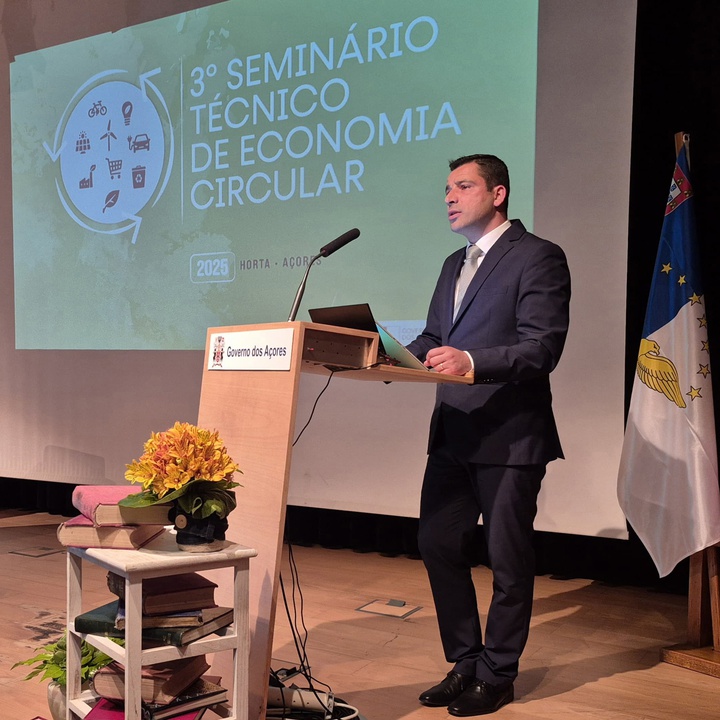Text size:
News

Regional Secretariat for the Environment and Climate Action promotes Technical Seminar on Circular Economy
June 6, 2025
The Regional Secretary for the Environment and Climate Action, Alonso Miguel, chaired the closing session of the 3rd Technical Seminar on the Circular Economy of the Azores, organised by the Regional Secretariat for the Environment and Climate Action, which took place on Monday at the João José da Graça Public Library and Regional Archive in the city of Horta.
Alonso Miguel began his speech by noting that "this seminar was an excellent opportunity to share knowledge and reflect on the circular economy. It is also an opportunity to showcase projects pointing the way forward in various areas, from good practices in waste prevention to the creation of quality certificates that promote sustainable practices, progress in the energy sector, the implementation of the circular economy in agriculture or the increase in waste segregation at the source; the latter with initiatives such as the deposit and reimbursement system for packaging or the system for collecting used coffee capsules."
According to the government official, "the transition to a circular economy is a very important goal for humanity, at a time when the planet is facing an emergency scenario, confronted with major challenges such as climate change, environmental pollution and the destruction of ecosystems, with worrying environmental, economic and social consequences."
The Regional Secretary emphasised that "it is essential to rethink consumption patterns and promote a paradigm shift, for which the transition to a circular economy plays an essential role." He added that "in island regions such as the Azores, which face particular challenges due to their geographical isolation, territorial limitations, scarce resources and heavy dependence on imports, this transition is not just an option but rather an absolute necessity."
Alonso Miguel emphasised "the effort undertaken in this area by the Regional Government, and in particular by the Regional Secretariat for the Environment and Climate Action." He highlighted "the creation of the Roadmap for the Regional Circular Economy, which aimed to adapt the new Action Plan for the Circular Economy to the Region, one of the main pillars of the European Green Deal, under which the Agenda for the Circular Economy of the Autonomous Region of the Azores was developed. This was in addition to other important measures, such as the creation of the Digital Platform for Circularity in the Azores, the Guide to Good Practices for the Organisation of Circular Events and the "Circular Event" Label."
The Regional Secretary emphasised that ‘the publication of the Agenda for the Circular Economy of the Azores in early 2025 represented a strategic step by helping to draw up a regional diagnosis. This included analysing material and energy flows, measuring economic metabolism, and creating a basic framework for assessing the potential and constraints for the development of a circular economy model."
"The model set out in the Agenda, duly coordinated with a broad process of creating, reviewing and updating regional legislation on waste prevention and management, carried out by the Regional Secretariat for the Environment and Climate Action, translates into 61 measures and actions for the 2023-2030 period. It includes wide-ranging measures and actions as well as specific measures, aimed at each strategic sector," he said.
The Regional Secretary recalled that, in addition to the approval of specific regional legislation aimed at reducing the consumption of single-use products, the new Strategic Programme for the Prevention and Management of Waste in the Azores - PEPGRA 20+ - was also created, which was approved in 2023. Several processes were also set in motion to revise the general scheme for the prevention and management of waste and the scheme for specific waste streams in the Region, which will soon be discussed by the Regional Parliament.
Alonso Miguel also emphasised that the Government has recently promoted several important initiatives in the field of the circular economy, including the pilot project for the implementation of a Deposit System for Non-Reusable Beverage Packaging in the Azores, as well as the recent creation of a system for collecting and recycling used coffee capsules in partnership with the Region's 19 municipalities and RECAPS.
The government official also highlighted "the work to restructure the Waste Processing Centres on six of the archipelago's islands, which represented an investment of around 6.1 million Euros." He reiterated his commitment to continuing the work of upgrading and strengthening the capacity of these infrastructures, with the recent "launch of a new procedure to modernise the recycling processes at the Waste Processing Centres on the islands of Pico, Graciosa, São Jorge, Santa Maria and Faial, with a planned investment of three million Euros."
Alonso Miguel concluded by saying that "the transition to the circular economy requires coherent public policies, adequate funding, education and training and, above all, a change in behaviour."
"The circular economy is not solely dependent on technological developments but rather on a new way of thinking, producing and living, which requires the involvement of society in general and each Azorean," he stressed.
The 3rd Technical Seminar on the Circular Economy in the Azores was attended by more than 200 registered participants and representatives from various organisations, such as the Regional Directorate for the Environment and Climate Action, the Portuguese Environment Agency, ISQ Portugal, the Portuguese Business Confederation, SDR Portugal, the Chamber of Commerce and Industry of Horta, the Horta City Council, Resiaçores, the Textile and Clothing Association of Portugal and EDA - Eletricidade dos Açores.

